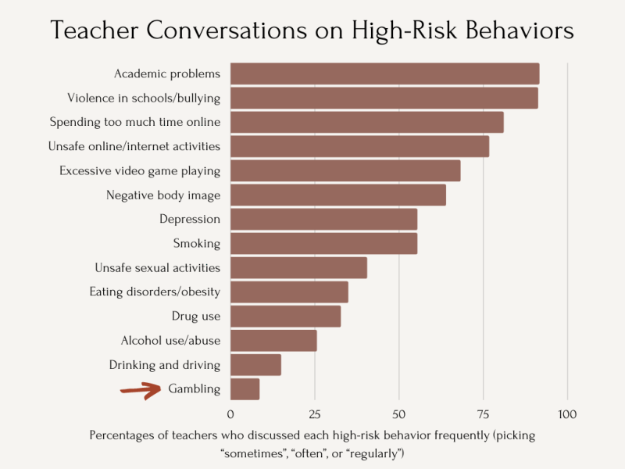Read the original article on the basis website HERE.
By Taylor Lee
Gambling is easily accessible to many people in the United Kingdom (UK), including adolescents, so it is important to be aware of the development of potential problems. Particularly with the widespread use of smartphones or computers, people can gamble from almost anywhere. Despite a legal gambling age of 18 in the UK, many younger individuals have both exposure (e.g., via advertisements or parental gambling) and access (e.g., with fake IDs and unregulated gambling). Some studies have found that underage participation in gambling is associated with adult Gambling Disorder. This week, The WAGER reviews a study by Amanda Roberts and colleagues that examined UK teachers’ lack of confidence in handling students’ gambling problems as compared to students’ drug or alcohol problems.
What was the research question?
What are teachers’ awareness of and attitudes towards adolescent gambling in the UK?
What did the researchers do?
This study surveyed 157 primary and secondary school teachers from UK mainstream schools using Qualtrics. In addition to demographic questions, teachers were assessed on their awareness of gambling involvement and problems among 11 – 16-year-olds. Teachers rated the seriousness of adolescent concerns and behaviors, reported how frequently they discuss these issues with students, and rated their confidence in handling various problems with Likert scale measures. The researchers calculated descriptive statistics for teachers’ awareness and used Cochran-Q tests of association and logistic regression analyses to compare teachers’ attitudes about gambling and confidence in addressing gambling in comparison to other adolescent concerns and behaviors.
What did they find?
Teachers viewed adolescent gambling as less serious compared to other adolescent concerns and behaviors such as negative body image, smoking, or academic problems. They discussed gambling with students the least frequently of all adolescent issues (see Figure) and reported significantly less confidence in addressing gambling problems when compared to other adolescent concerns and behaviors. Teachers also viewed excessive video gaming as more serious than gambling, suggesting that teachers may be unaware of similarities between the two.
 Figure. Percentages of teachers who discussed each high-risk behavior frequently (picking “sometimes”, “often”, or “regularly”). Total n = 157 primary and secondary school teachers from mainstream schools in the UK. Adapted from Figure 3 in Roberts et al. (2022). Click image to enlarge.
Figure. Percentages of teachers who discussed each high-risk behavior frequently (picking “sometimes”, “often”, or “regularly”). Total n = 157 primary and secondary school teachers from mainstream schools in the UK. Adapted from Figure 3 in Roberts et al. (2022). Click image to enlarge.
Why do these findings matter?
It is important to provide teachers with clear information about the dangers of underage gambling and tools to address problems if they arise. This study suggests that UK teachers likely need more awareness about gambling-related harms to help prevent students from engaging in underage gambling or harmful gambling behaviors. If teachers are adequately trained, they may be more comfortable starting conversations about the dangers of gambling and providing resources to at-risk students. Additionally, they will know how to appropriately approach a student with a gambling problem and provide support while pointing them to healthcare providers or treatment sources.
Every study has limitations. What are the limitations of this study?
This study has a small sample size, so results might not be generalizable to all teachers in the UK or in other countries. Also, this study did not provide participants with a clear definition of gambling behavior, which might have led to ambiguity over what behaviors should be counted as gambling. The wording of phrases such as “excessive video game playing” compared to “gambling” may have contributed to gambling appearing as a less severe issue.
For more information:
Do you think you or someone you know has a gambling problem? Visit the National Council on Problem Gambling for screening tools and resources. Individuals in the UK can visit GamCare for problem gambling information and helpful resources. For additional resources, including gambling and self-help tools, please visit The BASIS Addiction Resources page.

